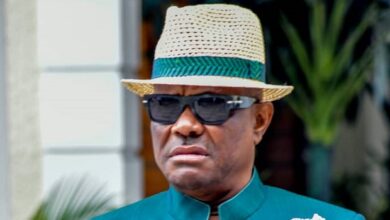
Twelve judges were appointed to the Federal Capital Territory (FCT) High Court, and a lawsuit against this appointment was dismissed by the Federal High Court in Abuja. In a ruling on Friday, Justice Inyang Ekwo determined that Azubuike Oko, the plaintiff, who identified himself as an attorney from Ebonyi State, did not have the necessary locus standi to bring the lawsuit.
Oko had, in the suit marked FHC/ABJ/CS/205/2024, protested the non-inclusion of lawyers from his state among the newly appointed judges of the High Court of the FCT.
He alleged that Ebonyi had been routinely excluded and marginalised with respect to the appointment of judges of the High Court of FCT by the court’s Chief Judge, the NJC and the Federal Judicial Service Commission (FJSC).
Oko claimed that it was the Chief Judge of the High Court of the FCT who computed the names of qualified lawyers from selected states, which he sent to the FJSC for recommendation to NJC for appointment by the President of Nigeria as judges of the court.
He said the states from which the new appointment was made are Bauchi, Bayelsa, Enugu, Imo, Kogi, Kwara, Lagos, Oyo, Plateau, Rivers, Taraba, and Zamfara.
He alleged that currently, Oyo and Kogi “already had two serving judges in the FCT High Court, and the two states were given additional slots to now have three judges, despite the fact that Ebonyi State has no single serving judge in the High Court of the FCT.
In the ruling on Friday, Justice Ekwo supported the objections made by the National Judicial Council (NJC), Justice Olukayode Ariwoola, the Chief Justice of Nigeria (CJN), and the Chief Judge of the Federal Constitutional Court (FCT), who was represented by Akinlolu Kehinde (SAN). The Chief Judge of the FCT, the First Defendant, the Second Defendant, or any other defendant in this matter are not claiming that the plaintiff has suffered personal injury for which he is seeking redress, according to the judge.
He noted that the plaintiff only claimed that he is from Ebonyi State of Nigeria, which has been routinely excluded and marginalised concerning the appointment of judges of the High Court of FCT by the 1st, 2nd and 3rd defendants (the CJN, NJC and the Federal Judicial Service Commission (FJSC).
Justice Ekwo held: “What the plaintiff needed to establish to demonstrate his locus standi is how the appointment being considered by the defendants has affected him as a person.
“Then he would have done so by showing that he applied to be considered by the defendants for appointment but he was ‘routinely excluded and marginalized.’
“On the other hand, he would have established that he is acting for any person or persons from Ebonyi State, who are qualified to be appointed and who have indeed applied to be considered for the said appointment, but had been ‘routinely and marginalised.’
“In other words, there is no averment that the plaintiff ever applied to be considered for the appointment in issue.
Justice Ekwo also faulted the plaintiff’s attempt to rely on his being from Ebonyi State to establish his locus standi to institute the suit.
He added: “The fact that the plaintiff is from Ebonyi State does not still avail him the locus to initiate this case because, in his view, Ebonyi State of Nigeria has been routinely excluded and marginalized with respect to the appointment of judges of the High Court of FCT by the 1st, 2nd and 3rd defendants.
Ebonyi State, for whose cause the plaintiff claims to undertake, is a legal entity established by the Constitution with requisite corporate characteristics, including the capacity to sue and be sued for any wrong done to it by any person.
Assuming that the plaintiff can sue on behalf of Ebonyi State of Nigeria, which according to him, has been routinely excluded and marginalized with respect to the appointment of judges of the High Court of FCT by the 1st, 2nd, and 3rd defendants, the averment that would have established his locus beyond any conjecture would be that the case is in a representative capacity and that he has the consent and authority of Ebonyi State of Nigeria to file the case.
It must be understood, at this point, that public interest litigation does not extend to suits purportedly filed on behalf of any person who has the capacity and wherewithal to seek remedy for any wrong done to his/her person but does not deem it necessary to do so.
“I find that Ebonyi State has the requisite capacity to seek remedy for any wrong done to it. For this reason, the plaintiff is obviously meddling in the affairs of the 1st, 2nd, and 4th defendants by taking up a cause of action against a state that has not authorized him to do so.
“It is the law that the court, in ascertaining whether the Plaintiff in an action has locus standi, pleadings, that is, the statement of claim, or the affidavit in support of the originating process, must disclose a cause of action vested in the plaintiff and the rights, obligations or interests of the plaintiff which have been violated;
Now, as the law is, where a plaintiff has been adjudged to lack locus stand, it does not matter whether that action is premature, speculative, and academic, or discloses no reasonable cause of action against the defendant, or the originating process is defective and incompetent, or the suit is not justiciable, or the suit is an abuse of court process.
Lack of focus stand ordinarily means the plaintiff has no legal right or authority to cross the threshold of the court for the matter at hand.
Once the court finds that the plaintiff lacks focus, then the case ends there. The court ceases to have jurisdiction to consider or decide any other issue in the suit, and this is the case here.
“It is the law that the claims must be struck out, and I am bound to follow the law. I, therefore, make an order striking out this action for lack of locus standi of the applicant,” Justice Ekwo said.



